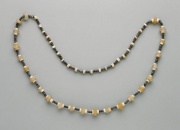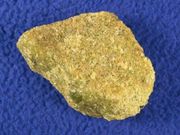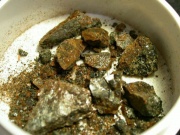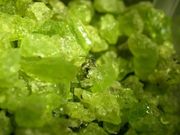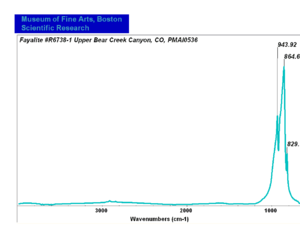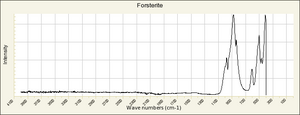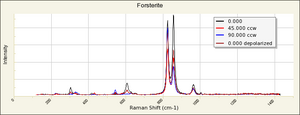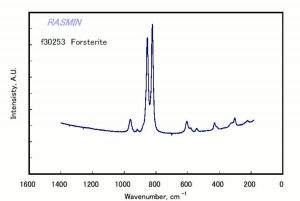Difference between revisions of "Olivine"
(username removed) |
|||
| (11 intermediate revisions by 3 users not shown) | |||
| Line 1: | Line 1: | ||
| − | [[File:13.3513-SC125464.jpg|thumb|]] | + | [[File:13.3513-SC125464.jpg|thumb|Egyptian beads<br>MFA# 13.3513]] |
== Description == | == Description == | ||
| − | + | [[File:Olivineemr3.jpg|thumb|Olivine]] | |
| − | An olive green color magnesium iron silicate mineral. Olivine occurs in igneous and metamorphic rocks and has two compositional varieties: [ | + | An olive green color magnesium iron silicate mineral. Olivine occurs in igneous and metamorphic rocks and has two compositional varieties: [[fayalite|fayalite]] (iron rich) and forsterite (magnesium rich). Olivine beads have been found in pre-Dynastic Egyptian jewelry. The opaque stone was found in Egypt, in the lava of Vesuvius and in the Eifel district of Germany. Transparent, gem quality stones, called [[peridot|peridot]], come from Zabargad (St. John's Island in the Red Sea) and from Minas Gerais (Brazil), South Africa, Myanmar (formerly Burma), Norway, British Columbia, and the U.S.(Arizona, Hawaii). |
| − | + | [[File:pf30266fayalite.jpg|thumb|Fayalite]] | |
| − | [[File: | + | [[File:pf30253forsterite.jpg|thumb|Forsterite]] |
== Synonyms and Related Terms == | == Synonyms and Related Terms == | ||
chrysolite; peridot (yellow-green); fayalite (Fe2SiO4); forsterite (Mg2SiO4); Olivin (Deut.); olivino (Esp.); peridoto (Esp.); olivine (Fr.); olivijn (Ned.); oliwin (Pol.); olivina (Port.) | chrysolite; peridot (yellow-green); fayalite (Fe2SiO4); forsterite (Mg2SiO4); Olivin (Deut.); olivino (Esp.); peridoto (Esp.); olivine (Fr.); olivijn (Ned.); oliwin (Pol.); olivina (Port.) | ||
| + | [[[SliderGallery rightalign|Fayalite, Upper Bear Creek CO.PNG~FTIR (MFA)|Forsterite IR-ATR RRUFF R040018.png~IR-ATR (RRUFF)|Forsterite Raman RRUFF R040018.png~Raman (RRUFF)|forsteriteRS.jpg~Raman (RASMIN)]]] | ||
| + | ==Physical and Chemical Properties== | ||
| − | + | * Orthorhombic crystal system with massive or granular forms | |
| − | + | * Fracture = uneven to conchoidal | |
| − | + | * Luster = vitreous | |
| − | + | * Streak = colorless | |
| − | Orthorhombic crystal system with massive or granular forms | + | * Transparent to translucent |
| − | + | * Fluorescence = none | |
| − | Fracture = uneven to conchoidal | + | * Pleochroism = weak yellow-green and green (noticeable only in dark stones) |
| − | |||
| − | Transparent to translucent | ||
{| class="wikitable" | {| class="wikitable" | ||
| Line 31: | Line 31: | ||
|- | |- | ||
! scope="row"| Density | ! scope="row"| Density | ||
| − | | 3.27-3.37 | + | | 3.27-3.37 g/ml |
| + | |- | ||
| + | ! scope="row"| Refractive Index | ||
| + | | 1.64 - 1.70 | ||
| + | |- | ||
| + | ! scope="row"| Birefringence | ||
| + | | 0.035 - 0.040 | ||
|} | |} | ||
| − | |||
| − | |||
| − | |||
| − | |||
== Comparisons == | == Comparisons == | ||
| Line 42: | Line 44: | ||
[[media:download_file_423.pdf|Properties of Common Gemstones]] | [[media:download_file_423.pdf|Properties of Common Gemstones]] | ||
| − | + | ==Resources and Citations== | |
| − | + | * B.Aston, J.Harrell, I.Shaw, "Stone" in ''Ancient Egyptian Materials and Technology'', P.Nicholson, I.Shaw (eds.), Cambridge University Press, 2000, p. 47-48. | |
| − | == | + | * Gem Identification Lab Manual, Gemological Institute of America, 2016. |
| − | + | * Mineralogy Database: [http://www.webmineral.com/data/Olivine.shtml Olivine] | |
| − | + | * Jack Odgen, ''Jewellery of the Ancient World'', Rizzoli International Publications Inc., New York City, 1982 | |
| − | + | * R.F.Symmes, T.T.Harding, Paul Taylor, ''Rocks, Fossils and Gems'', DK Publishing, Inc., New York City, 1997 | |
| − | + | * C.W.Chesterman, K.E.Lowe, ''Audubon Society Field Guide to North American Rocks and Minerals'', Alfred A. Knopf, New York, 1979 | |
| − | + | * Wikipedia: [https://en.wikipedia.org/wiki/Olivine Olivine] (Accessed Nov. 9, 2005 and Dec 2022) | |
| − | |||
| − | |||
| − | |||
| − | |||
| − | * | ||
| − | |||
| − | * | ||
| − | |||
| − | * | ||
| − | |||
| − | * Wikipedia | ||
| − | |||
* ''Van Nostrand's Scientific Encyclopedia'', Douglas M. Considine (ed.), Van Nostrand Reinhold, New York, 1976 | * ''Van Nostrand's Scientific Encyclopedia'', Douglas M. Considine (ed.), Van Nostrand Reinhold, New York, 1976 | ||
| − | + | * Random House, ''Webster's Encyclopedic Unabridged Dictionary of the English Language'', Grammercy Book, New York, 1997 | |
| − | * | + | * ''Encyclopedia Britannica'', http://www.britannica.com Comment: "olivine." Accessed 9 Dec. 2004 . |
| − | |||
| − | * ''Encyclopedia Britannica'', http://www.britannica.com Comment: "olivine." | ||
| − | |||
* ''The American Heritage Dictionary'' or ''Encarta'', via Microsoft Bookshelf 98, Microsoft Corp., 1998 | * ''The American Heritage Dictionary'' or ''Encarta'', via Microsoft Bookshelf 98, Microsoft Corp., 1998 | ||
| − | + | * G.S.Brady, ''Materials Handbook'', McGraw-Hill Book Co., New York, 1971 Comment: p. 561 | |
| − | * | + | * Richard S. Lewis, ''Hawley's Condensed Chemical Dictionary'', Van Nostrand Reinhold, New York, 10th ed., 1993 |
| − | |||
| − | * | ||
[[Category:Materials database]] | [[Category:Materials database]] | ||
Latest revision as of 09:41, 21 December 2022
Description
An olive green color magnesium iron silicate mineral. Olivine occurs in igneous and metamorphic rocks and has two compositional varieties: Fayalite (iron rich) and forsterite (magnesium rich). Olivine beads have been found in pre-Dynastic Egyptian jewelry. The opaque stone was found in Egypt, in the lava of Vesuvius and in the Eifel district of Germany. Transparent, gem quality stones, called Peridot, come from Zabargad (St. John's Island in the Red Sea) and from Minas Gerais (Brazil), South Africa, Myanmar (formerly Burma), Norway, British Columbia, and the U.S.(Arizona, Hawaii).
Synonyms and Related Terms
chrysolite; peridot (yellow-green); fayalite (Fe2SiO4); forsterite (Mg2SiO4); Olivin (Deut.); olivino (Esp.); peridoto (Esp.); olivine (Fr.); olivijn (Ned.); oliwin (Pol.); olivina (Port.)
Physical and Chemical Properties
- Orthorhombic crystal system with massive or granular forms
- Fracture = uneven to conchoidal
- Luster = vitreous
- Streak = colorless
- Transparent to translucent
- Fluorescence = none
- Pleochroism = weak yellow-green and green (noticeable only in dark stones)
| Composition | (Mg,Fe)2SiO4 |
|---|---|
| CAS | 1317-71-1 |
| Mohs Hardness | 6.5 - 7.0 |
| Density | 3.27-3.37 g/ml |
| Refractive Index | 1.64 - 1.70 |
| Birefringence | 0.035 - 0.040 |
Comparisons
Properties of Common Gemstones
Resources and Citations
- B.Aston, J.Harrell, I.Shaw, "Stone" in Ancient Egyptian Materials and Technology, P.Nicholson, I.Shaw (eds.), Cambridge University Press, 2000, p. 47-48.
- Gem Identification Lab Manual, Gemological Institute of America, 2016.
- Mineralogy Database: Olivine
- Jack Odgen, Jewellery of the Ancient World, Rizzoli International Publications Inc., New York City, 1982
- R.F.Symmes, T.T.Harding, Paul Taylor, Rocks, Fossils and Gems, DK Publishing, Inc., New York City, 1997
- C.W.Chesterman, K.E.Lowe, Audubon Society Field Guide to North American Rocks and Minerals, Alfred A. Knopf, New York, 1979
- Wikipedia: Olivine (Accessed Nov. 9, 2005 and Dec 2022)
- Van Nostrand's Scientific Encyclopedia, Douglas M. Considine (ed.), Van Nostrand Reinhold, New York, 1976
- Random House, Webster's Encyclopedic Unabridged Dictionary of the English Language, Grammercy Book, New York, 1997
- Encyclopedia Britannica, http://www.britannica.com Comment: "olivine." Accessed 9 Dec. 2004 .
- The American Heritage Dictionary or Encarta, via Microsoft Bookshelf 98, Microsoft Corp., 1998
- G.S.Brady, Materials Handbook, McGraw-Hill Book Co., New York, 1971 Comment: p. 561
- Richard S. Lewis, Hawley's Condensed Chemical Dictionary, Van Nostrand Reinhold, New York, 10th ed., 1993
